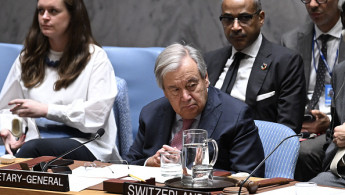France: Israel's 'persona non grata' designation of UN chief 'unjustified'
France on Thursday condemned Israel's move to declare UN chief Antonio Guterres "persona non grata", saying the decision was "unjustified."
"France regrets the unjustified, serious and counter-productive decision taken by Israel to declare the secretary general of the United Nations, Mr Antonio Guterres, persona non grata," the French foreign ministry said in a statement.
Paris said it had "full support for and confidence" in Guterres, adding that the United Nations played "a fundamental role in the stability of the region."
Israel on Wednesday declared the UN leader "persona non grata", accusing him of failing to specifically condemn Iran's missile attack on Israel. Guterres' initial comments highlighted the "broadening conflict in the Middle East" without mentioning Iran's attack. He did later condemned Iran's missile barrage.
Israel has been a harsh critic of the UN, with ties between the state and the international body souring even more after Tel Aviv launched its war on Gaza on 7 October.
The United States has already criticised the move by its ally. And EU foreign affairs chief Josep Borrell also defended Guterres in a speech in Pontevedra in his native Spain saying that "attacks on the UN secretary general" must be rejected.
"Yes everything started with the terrorist attacks by Hamas that we condemn, but these attacks, as the UN secretary general has said, didn't come from nowhere," Borrell declared.
The attacks were "the umpteenth chapter of, a long story that started before," he added.
"To say that should not mean someone being called or given the insult of being anti-Semitic," said Borrell. "This word should not be trivialized... it is too serious, too painful to be applied to someone who expresses an opinion different from that of a government."
Borrell said Israel has the right to defend itself "but this right, like all rights, has limits."
"The question that we, Europeans, do not want to ask ourselves, or at least do not want to answer, is whether these limits have been reached. My answer is yes, unfortunately," he said.




 Follow the Middle East's top stories in English at The New Arab on Google News
Follow the Middle East's top stories in English at The New Arab on Google News

![A group of Palestinians, foreign and Israeli activists gather to participated in an olive picking event on the land in the town of Battir, which is under threat of confiscation by Israel in Bethlehem, occupied West Bank on 8 November 2024. [Getty]](/sites/default/files/styles/image_330x185/public/2182930803.jpeg?h=199d8c1f&itok=__0LgGsa)
